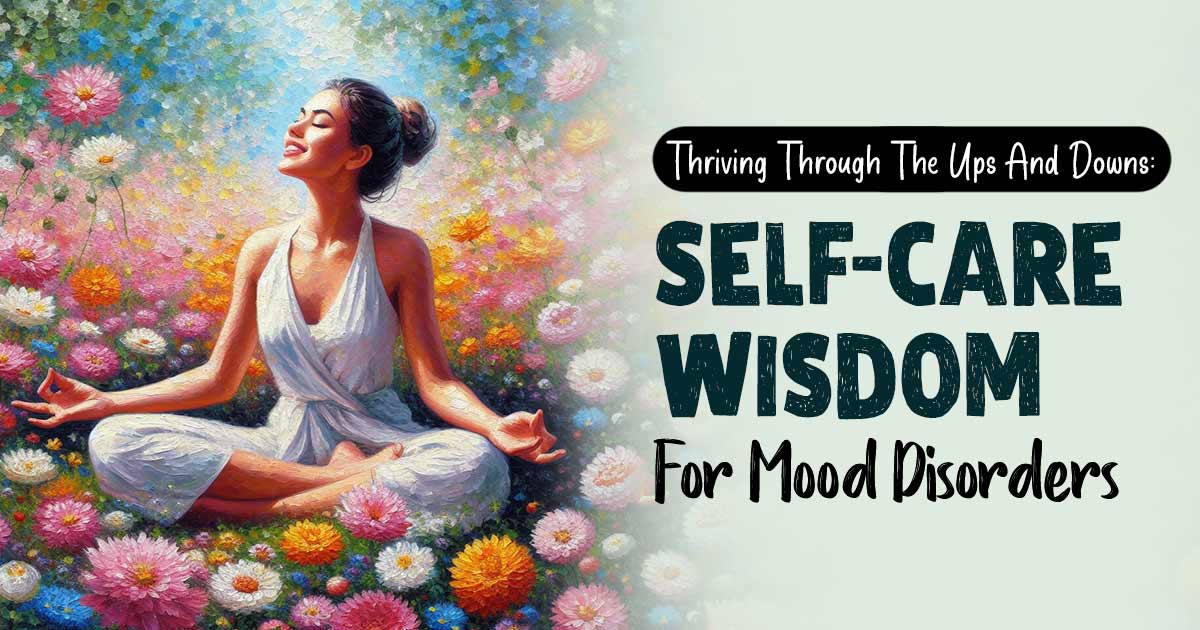Mood disorders, encompassing conditions such as depression and bipolar disorder, profoundly impact the lives of individuals, often leading to debilitating emotional states. In the quest for effective management and alleviation of symptoms, the concept of self-care emerges as a powerful and complementary strategy. Research, in fact, as claimed that practices of self-care for managing mood disorders:
Understanding Mood Disorders
Mood disorders are characterized by persistent disturbances in a person’s emotional state, encompassing extremes of mood, energy, and activity levels. Depression, marked by persistent sadness and a lack of interest or pleasure in daily activities, contrasts with bipolar disorder, where individuals experience episodes of both depression and mania. These disorders significantly impact one’s quality of life, relationships, and overall functioning, necessitating multifaceted approaches for effective management.
Why Self-care For Managing Mood Disorders Is Important
Self-care, often misconstrued as indulgent or superficial, is a holistic approach to nurturing one’s physical, mental, and emotional well-being. In the context of mood disorders, it serves as a crucial adjunct to traditional therapeutic interventions, providing individuals with tools to actively participate in their healing journey.
The intricate interplay between self-care and mood disorder management lies in the ability of personalized, intentional practices to address the unique needs and challenges posed by these conditions.
1. Personalized Coping Strategies
The link between self-care and mood disorder acknowledges the individuality of experiences and symptoms associated with mood disorders. By adopting a personalized approach, individuals can identify and implement coping strategies that resonate with their unique needs. Whether it involves practicing mindfulness, engaging in creative pursuits, or establishing healthy routines, tailoring self-care practices enhances their efficacy in managing the complexities of mood disorders.
2. Empowerment And Agency
The journey of managing mood disorders often entails feelings of helplessness and a loss of control. Incorporating self-care empowers individuals to reclaim agency over their well-being. By actively participating in practices that promote mental and emotional health, individuals with mood disorders can cultivate a sense of mastery, breaking free from the chains of passivity that often accompany these conditions.
3. Holistic Wellness
Mood disorders affect not only the mind but also the body and spirit. Self-care embraces a holistic perspective, recognizing the interconnectedness of physical, mental, and emotional well-being. Engaging in activities that promote physical health, such as regular exercise and balanced nutrition, complements therapeutic interventions and contributes to an overall sense of wellness.
4. Stress Reduction
Stress is a common trigger and exacerbating factor in mood disorders. Self-care practices, particularly those focused on stress reduction, play a pivotal role in managing symptoms. Techniques such as deep breathing, meditation, and progressive muscle relaxation contribute to the regulation of the body’s stress response, mitigating the impact of chronic stress on mood disorders.
5. Establishing Healthy Boundaries
Individuals with mood disorders often grapple with the challenge of setting and maintaining boundaries in relationships. Practices of self-care for managing mood disorders involve recognizing the importance of healthy boundaries and cultivating the skills to establish and communicate them effectively. This not only fosters healthier interpersonal dynamics but also contributes to emotional stability.
6. Medication Adherence
For those with mood disorders requiring medication, self-care extends to the conscientious adherence to prescribed treatments. Establishing a routine for medication intake, attending regular medical appointments, and communicating openly with healthcare providers are integral aspects of self-care that contribute to the overall management of mood disorders.
7. Routine And Structure
The unpredictable nature of mood disorders can disrupt daily routines and activities, exacerbating symptoms. Self-care for managing mood disorders emphasizes the establishment of consistent routines and structures, providing a stabilizing framework for the sufferers. Predictability in daily life can contribute to a sense of security and control, mitigating the impact of mood fluctuations.
8. Social Support And Connection
Isolation is a common challenge for individuals with mood disorders. Self-care for managing mood disorders involves actively seeking and maintaining social connections. Whether through support groups, therapy, or social activities, fostering meaningful connections contributes to a sense of belonging and provides a crucial support network for individuals navigating the complexities of mood disorders.
9. Reflection And Journaling
Self-awareness is a cornerstone of effective mood disorder management. Self-care practices, such as reflection and journaling, provide individuals with a means to explore and understand their thoughts and emotions. This introspective process can enhance emotional regulation and contribute to a deeper understanding of triggers and patterns associated with mood fluctuations.
10. Professional Guidance
While self-care for managing mood disorders can be effective, it does not replace the need for professional guidance. Individuals with mood disorders benefit from the expertise of mental health professionals who can offer tailored interventions, therapeutic support, and, when necessary, medication management. Self-care complements and enhances the effectiveness of professional treatment, fostering a collaborative approach to managing mood disorders.
In the intricate tapestry of mood disorder management, self-care emerges as a thread of resilience, offering individuals the means to actively engage in their healing journey. By acknowledging the symbiotic relationship between practices of self-care and mood disorder management, individuals can navigate the complexities of their mental health with a sense of agency, fostering a path towards greater well-being and emotional stability.





